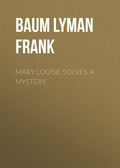
Лаймен Фрэнк Баум
The Last Egyptian
CHAPTER XIV
ROGUES ANCIENT AND MODERN
Consinor arrived early at the Lotus Club and took his seat at a small table facing the doorway, where he whiled away the time by playing solitaire.
Presently Kāra entered and greeted him cordially, seeming to be in an especially happy mood.
“Well, shall we try our luck?” he said, seating himself at the opposite side of the table.
Nodding assent, Consinor gathered up the cards and shuffled them. Several loungers who knew of the previous game and wondered what the next meeting between the two men would evolve, clustered around the table to watch the result.
Kāra won the cut and dealt. He played rather carelessly and lost. The stakes were a pound sterling.
“Double!” he cried, laughing, and again the viscount nodded.
The luck had shifted, it seemed, for the prince repeatedly lost. At first he chatted gaily with those present and continued to double with reckless disregard of his opponent’s success; but by and by he grew thoughtful and looked at his cards more closely, watching the game as shrewdly as his adversary. The stakes had grown to four hundred pounds, and a subtle thrill of excitement spread over the little group of watchers. Was Consinor going to win back his ten thousand pounds at one sitting?
Suddenly Kāra, in dealing, fumbled the cards and dropped one of them. In reaching to pick it up it slipped beneath his foot and he tore it into two. It was the queen of hearts.
“How stupid!” he laughed, showing the pieces. “Here, boy, bring us a fresh pack of cards,” addressing an attendant.
Consinor scowled and reached out his hand for the now useless deck. Kāra slipped the cards into his pocket, including the mutilated one.
“They are mine, prince,” said the viscount; “I use them for playing my game of solitaire.”
“Pardon, but I have destroyed their value,” returned Kāra. “I shall insist upon presenting you with a new deck, since my awkwardness has rendered your own useless.”
Consinor bit his lip, but made no reply, watching silently while the prince tore open the new deck and shuffled the cards.
The viscount lost the next hand, and the score was evened. He lost again, and still a third time.
“The luck has changed with the new cards,” said he. “Let us postpone the game until another evening, unless you prefer to continue.”
“Very well,” Kāra readily returned, and throwing down the cards, he leaned back in his chair, selected a fresh cigar from his case and carefully lighted it.
Consinor had pushed back his own chair, but he did not rise. After watching Kāra’s nonchalant movements for a time, the viscount drew from his pocket three curious dice, and after an instant’s hesitation tossed them upon the table.
“Here is a curiosity,” he remarked. “I am told these cubes were found in an Egyptian tomb at Thebes. They are said to be three thousand years old.”
The men present, including Kāra, examined the dice curiously. The spots were arranged much as they are at the present day, an evidence that this mode of gambling has been subjected to little improvement since the early Egyptians first invented it.
“They are excellently preserved,” said van Roden. “Where did you get them, viscount?”
“I picked them up the other day from a strolling Arab. They seemed to me very quaint.”
“There are several sets in the museum,” remarked Pintsch, a German in charge of the excavations at Dashur. “It is very wonderful how much those ancients knew.”
Lord Consinor drew the dice toward him.
“See here, Prince,” said he, “let us try our luck with these antiquities. It is quicker and easier than écarté.”
“Very well,” consented Kāra. “What are the stakes?”
“Let us say a hundred pounds the throw.”
This suggestion startled the group of spectators; but Kāra said at once:
“I will agree to that, my lord.”
He lost once, twice, thrice.
Then, as Consinor, with a triumphant leer, pushed the dice toward him, Kāra thrust his hands in his pockets and said in a quiet voice to the onlookers:
“Gentlemen, I call upon you to witness that I am playing with a rogue. These dice are loaded.”
Following a moment’s horrified silence, the viscount sprang up with an oath.
“This is an insult, Prince Kāra!” he cried.
“Sit down,” said Colonel Varrin, sternly. “No mere words can condemn you, sir. Let us examine the dice.”
The others concurred, their faces bearing witness to their dismay and alarm. Such a disgraceful occurrence had never before been known within those eminently respectable walls. The honor of the club was, they felt, at stake.
The cubes were carefully tested. It was as Kāra had charged – they were loaded.
“Can you explain this, Lord Consinor?” asked one of the party.
“I cannot see why I should be called upon to explain,” was the reply. “In purchasing the dice, I was wholly ignorant of their condition. It was a mere impulse that led me to offer to play with them.”
“It is well known that these ancient dice are frequently loaded,” interrupted Pintsch, eagerly, as if he saw a solution of the affair. “Two of the sets exhibited in the museum have been treated in the same clever manner.”
“That is true,” agreed Varrin, nodding gravely.
“In that case,” said Consinor, “I am sure you gentlemen will exonerate me from any intentional wrong. It is simply my misfortune that I offered to play with the dice.”
“Was it also your misfortune, my lord,” returned Kāra, calmly, “that you have been playing all the evening with marked cards? I will ask you to explain to these gentlemen why this deck, which you have claimed in their presence to be your private property, bears secret marks that could only have been placed there with one intent – to swindle an unsuspecting antagonist.”
He drew the cards from his pocket as he spoke and handed them to Colonel Varrin, who examined them with a troubled countenance and then turned them over to his neighbor for inspection.
While the cards passed around, Consinor sat staring blankly at the group. The evidence against him was so incontrovertible that he saw no means of escape from the disgrace which was sure to follow.
“Gentlemen,” said Kāra, when the last man had examined the cards and laid them upon the table again, “I trust you will all bear evidence that it is not my usual custom or desire to win money from those I play with. Rather do I prefer to lose, for in that way I obtain the amusement of playing, without the knowledge that I may have inconvenienced my friends. But when a common trickster and cheat conspires to rob me, my temper is different. Lord Consinor owes me ten thousand pounds, and I demand from him in your presence prompt payment of the debt. Also, I depend upon you to protect me and my fellow-members from card sharpers in the future, which I am sure you will gladly do. For the rest, the matter is in your hands. Good evening, gentlemen.”
He bowed with dignity and withdrew. The others silently followed, scattering to other rooms of the club. Varrin, as a club official, took with him the incriminating dice and the marked cards.
Lord Consinor, knowing well that he was ruined, sat muttering curses upon Kāra and his own “hard luck” until he noticed the deserted room and decided to go home. The disaster had fairly dazed him, so that he failed to realize the fact that as he called for his hat and coat in the lobby the groups of bystanders ceased their eager talk and carefully turned their backs in his direction.
The viscount had never heard of Hatatcha; yet it was her vengeance that had overtaken him.
CHAPTER XV
WINSTON BEY IS INDIGNANT
In their rooms at the Savoy next morning Lord Roane and his son quarreled violently. The day’s paper contained a full account of the affair at the club, and while no names were mentioned, there was no misunderstanding who the culprit was. “An English nobleman who had lately arrived to fill an important position in the Ministry of Finance was detected playing with marked cards and loaded dice by a well-known Egyptian gentleman of wealth and high station, who promptly exposed the fraud in the presence of several reputable club members. Fortunately, the Englishman’s name had only been posted and he had not yet been admitted to membership in the club, so that his trickery and consequent disgrace in no way reflects upon that popular and admirably conducted institution, etc.”
Lord Roane was vastly chagrined and indignant as he read the account.
“You low, miserable scoundrel!” he roared, facing his son; “how dare you drag the name of your family in the mire, just as we are assuming an indisputable position of respectability in Cairo? To be a gambler is despicable enough, but to become a common cheat and swindler is utterly unpardonable. What have you to say for yourself?”
“Nothing,” said Consinor, sullenly. “I am innocent. It was a plot to ruin me.”
“Pah! a plot of yours to ruin others rather. Speak up, man! Have you nothing to say to excuse or palliate your shame and dishonor?”
“What use?” asked the viscount, apathetically. “You will not believe me.”
“Do you believe him, Aneth?” asked the old man, turning to gaze upon the girl’s horrified face. “Do you believe that this cur, who is my son and your father, is innocent?”
“No,” she answered, shrinking back as Consinor looked up curiously to hear her reply. “He has deceived me cruelly. He promised me he would not touch a card again, or play for money, and he has broken his word. I cannot believe him now.”
“Of course not,” her father retorted, reddening for the first time. “My precious family is so rotten throughout that even its youngest member cannot give a Consinor credit for being honest or sincere.”
“See here, Roger; I will not have Aneth insulted, even by you. I’m not a saint, I’ll admit; but I’ve never been guilty of petty swindling, and your daughter is pure enough to shame us both. As for you, I’ve done with you, and you must from this time work out your salvation in your own way. You’ve dissipated any inheritance you might have had; but I’ll give you a thousand pounds in cash if you’ll take your ugly face out of Cairo and promise not to come near us again. I’ll take care of your wife and daughter, neither of whom, I am positive, will miss you for a single hour.”
“It’s a good offer,” said Consinor, quickly, “and I’ll accept it. Where did you get the thousand pounds?”
“That,” declared my lord, stiffly, “is none of your accursed business! Now go. Leave your resignation with the Minister of Finance and then make yourself scarce. Here, I’ll write you a check now.”
Consinor took the paper.
“If it is good, and the bank will cash it,” he said, slowly, “I’ll do as I have agreed, and not trouble you again. Good-by, Aneth. Look out for that snakey Egyptian who is following you around. He alone is responsible for this affair, and you cannot afford to trust him; and give my fond farewell to your mother. She won’t mind if I do not appear in person to irritate her nerves.”
“Where will you go?” asked Lord Roane.
“That, sir, to repeat your own words, is none of your accursed business.”
With this filial response he left the room, and Aneth burst into a flood of tears. Never had she felt so wretched and humiliated as at this discovery of her father’s infamy, and although Roane tried to comfort his granddaughter by pointing out the fact that Roger had long been a gambler with a character not above suspicion, the girl had so fondly hoped for her father’s regeneration that her disappointment was indeed bitter.
“It won’t hurt us so very much, my child,” continued the old nobleman, stroking her head soothingly. “The world will know we have repudiated Roger, and will sympathise with our distress. In a few months the scandal will be forgotten, and we may again hold up our heads. I’m afraid I’ve lived a rather wicked life, my dear; but for your sake I would like to retrieve my good name and die possessed of the honor and respect of all my fellow-men. And this, I believe, I can accomplish. Don’t worry, little one! Be brave, and the blow will not hurt half so much.”
There were tears in his own eyes as he marked her distress, and he continued to encourage her until the young girl had partly recovered her self-control and the first shock of her sudden misfortune had been blunted. Then he kissed her tenderly and went away to his office.
The account in the morning paper had likewise caused Gerald Winston considerable amazement and dismay. His first thought was of Aneth and the trouble that had come to her; his next a feeling of resentment toward Kāra. After pacing the floor restlessly for an hour, he called for his saddle-horse and rode down the Shubra road to interview the Egyptian at his villa.
Kāra was at home and received his visitor with cold politeness, which Winston passed unnoticed. He was not in a mood to be affected by trifles.
“I understand that you accused Consinor of cheating at the club last night,” he began, impetuously.
“Well?” said Kāra, lifting his brows inquiringly.
“Why did you do it?”
“Because it was true. He was robbing me.”
“You know what I mean, sir! You have been posing as a friend of Miss Consinor. To expose her father to public shame was the act of a cowardly enemy.”
“What would you have done in my place?” asked Kāra, calmly.
“I? I would have concealed the discovery and allowed the man to go, refusing to play with him again,” declared Winston.
“And so have allowed him to rob others, perhaps?”
“If necessary, yes, that his daughter’s good name might be protected. But a private warning would have induced him to abandon further trickery.”
“He is an old offender, I believe,” said Kāra, leaning back in his chair and regarding the other with an amused expression. “It might benefit you to reflect that Miss Consinor’s good name has not been acquired on account of her father’s respectability, any more than through the reputation of her grandsire, who has grown old in iniquity. Therefore, I cannot believe that I have injured her in any way.”
A tinge of passionate hatred in the man’s voice as he referred to Lord Roane aroused Winston’s attention. Then, suddenly, a light broke upon him.
“See here, Kāra,” he said, sternly, “are you persecuting these people and plotting against them because of the old wrong that Roane did your grandmother, Hatatcha?”
“I am neither persecuting nor plotting against them,” declared Kāra. “Consinor has ruined himself unaided. As for his daughter, I have every object in protecting her from scandal.”
“What do you mean by that, sir?”
“I intend to marry her.”
At this cool statement Winston stared aghast. Then he gave a bitter laugh.
“That is absurd and impossible,” he said.
“Why so?”
“You are cousins.”
“She does not know that, and you will not tell her because you have so much regard for her grandfather’s good name,” with a sneer.
“I see. It is your plot to ruin her; but it will fail, because she will never consent to marry you,” he continued.
“How do you know that?” asked Kāra.
“It is improbable that she can love you.”
“In that, sir, I am inclined to differ with you. Even if Aneth discovered our relationship, it would not matter. In olden days our Egyptian kings married their sisters. And I suppose that Lord Roane would emphatically deny the assertion that I am his grandson. I would myself deny it, and you have no proof to back your statement of the fact.”
“You told me the story with your own lips.”
“To be sure – and the story was true. I do not mind acknowledging it at this moment, because there are no witnesses present; but if you repeat the statement in public, I will deny it absolutely.”
For a moment Winston remained thoughtfully silent. Then he said:
“You are proposing a dreadful crime, Kāra, but it will avail you nothing to defy morality in this way. There is another reason why Miss Consinor will refuse to marry you, and it is entirely distinct from the subject of your relationship.”
“To what do you refer?”
“To the woman you are keeping, even now, in your harem. It is a matter of public scandal, and I am surprised that society has not already ostracized you for your audacious defiance of propriety. You are neither an Arab nor a Mohammedan. Doubtless the offense has not yet come to Miss Consinor’s ears; but if it does, have you any idea she would place her happiness in the hands of a man of your character?”
Kāra frowned. Here was a weapon against him that he had never before recognized.
“I suppose you will take pains to inform Miss Consinor that I have a slave-girl among my servants,” he said, mockingly.
“I shall ask Mrs. Everingham to tell her the truth concerning your domestic relations,” returned Winston, decidedly.
The Egyptian arose.
“I think it will be as well to end this interview, Winston Bey,” he said. “You are yourself a pretender for the hand of my future bride, and it is useless to endeavor to fairly discuss matters wherein you are so selfishly concerned.”
“Do you choose to defy my warnings?” asked Winston, angrily.
“By no means. I merely ignore your implied threats. They can in no way interfere with my plans.”
“I believe,” said Winston, striving to control his indignation, “that those plans are inspired by hatred rather than love. I shall do my best to oppose them.”
“Naturally. It is your privilege, sir.”
Winston turned to go.
“I shall always regret,” he remarked, bitterly, as a parting shot, “that I was so foolish as to bring a filthy native from out the natural environment of his mud village.”
“The filthy native would have found other means of escape had you not brought him; so you need not reproach yourself,” returned Kāra, with a smile. “But the trifle you have mentioned should not be your deepest regret, my stupid Englishman!”
“Did I do anything more foolish?”
“Yes.”
“What was it?”
“You kicked me twice beneath the palms of Fedah.”
“Ah! I should not have restrained myself to two kicks.”
“Be content, sir. Twice was sufficient, since it is liable to cause you much unhappiness. I had it in mind, had you kicked me again, to kill you.”
Winston left the villa more thoughtful than he had been on his arrival. The matter involved much more, it seemed, than the loss of Lord Consinor’s reputation. Kāra’s confident tone had not failed to impress his rival, and the Englishman was more uneasy than he cared to admit even to himself. His love for Aneth was sincere and unselfish, and he could imagine no greater calamity for the girl than to acquire a fondness for the treacherous native whose presence he had just left. Such a contingency had not occurred to him before, and for this reason Kāra’s claims were as startling as they were revolting. He longed to go to the girl at once and strive to comfort her in this, her hour of sorrow; but a natural delicacy restrained him. She would like to be alone, at first, until she had somewhat recovered from the humiliation she would be sure to suffer at the public exposure of her father’s misdeeds. Afterward he could assure her of his confidence and friendship, and, when the proper time came, of his love. Meantime he contented himself by sending Aneth a basket of the most beautiful roses to be found in Cairo.
No such delicacy of feeling influenced Kāra. In the afternoon he went to the Savoy and sent up his card.
Aneth was alone, Mrs. Everingham having just left her for a drive. The girl received the Egyptian almost with eagerness.
“Can you forgive me, Prince?” she asked, by way of greeting, as she stood before him with scarlet cheeks and downcast eyes.
“Forgive you for what, Miss Aneth?” he replied, gently.
“For – for the wrong my father did you,” she stammered.
Kāra smiled, and she glanced up shyly in time to catch his expression of amusement.
“Let us sit down and talk it over,” he said, taking her hand and leading her to a chair. “But it will be unnecessary, I am sure, for me to say that I have nothing to forgive, since you have in no way offended.”
“But my father – ” she began, timidly, again dropping her eyes in shame.
“Yes, I know, Miss Aneth,” said he. “Your father did a foolish thing, for which people will justly condemn him. I am very sorry that it was through me he was detected, but I assure you I was powerless to prevent it. Others saw the marked cards and forced the accusation against him. Believe me, I would have saved him if possible; but I could not.”
“I believe you, Prince Kāra,” she said. “It was all my father’s fault, and his punishment is only such as he deserved.”
“I am deeply grieved for your sake,” continued Kāra, and indeed the sight of her sweet face, convulsed with anguish, so appealed to him at the moment that his speech was almost sincere. “I know what this disgrace will mean to you, Aneth – the avoidance of your former associates, and the jeers, perhaps, of those who have envied you. The world is heartless always, and visits the sins of the fathers upon their children; so that your innocence will not be considered save by your truest friends.”
He paused, for she was crying now, softly but miserably, and the tears moved him strangely.
“That is why I have come,” he continued, his voice trembling with earnestness, “to assure you of my faith in you and of my steadfast friendship. Nay, more; I offer to protect you against the sneers of all the world, if you will grant me the right.”
The girl started, glancing nervously and almost affrightedly into his face.
“I – I do not understand you, Prince Kāra,” she murmured.
“Then I must speak more plainly,” he quickly rejoined, springing up to stand before her with sparkling eyes and outstretched hands.
“Aneth, my sweet one, I love you! To me you represent the joys of earth and the delights of paradise. Only in your presence do I find happiness and content. Be my wife, Aneth; give me yourself, and I will guard you so well and place you so high that all the world will bow at your feet.”
The speech shocked her, for there was no mistaking the man’s earnestness. Nor did she know how to reply, the proposal being as unexpected as it was inopportune. Aneth may have had vague dreams of love, as maidens will and should have; but she had been so happy in Cairo that she had not thought the attentions of Kāra meant more than the kindly good-fellowship of the other men she had met. Indeed, she had not considered such a subject at all, and at this hour, when her heart was wrung with grief, she found in it no response to her suitor’s fervid appeals.
“I cannot reply to you just now, Prince Kāra,” she said, with hesitation; “it is all new to me, and quite unexpected, and – and I do not wish to marry anyone.”
His face hardened as he gazed upon her timid, shrinking form, but the longing in his dark eyes remained. With all his lately acquired polish, the native failed to comprehend that an English girl does not yield herself to the demands of any man unless her heart and inclinations lead her to acknowledge his authority. But he was wise enough to perceive that the difficulties of the situation required tact if he wished to succeed.
“Aneth,” said he, more quietly, “this is no time for evasions or misunderstandings between us. I have told you that I love you, that my earnest desire is to make you my wife. You need a protector at this moment, and a delay is as foolish as it is dangerous to your interests. If you love me at all, you can tell me so to-day as well as later.”
“Ah, that is it, Prince! I’m afraid that I do not love you in the way that you wish,” answered the girl, aroused to a more dignified tone by his persistence. “I am very grateful to you, Prince Kāra, and appreciate the honor of your proposal; but I have nothing more to offer you than my sincere friendship.”
“Then I will accept that as sufficient for the time being,” said he. “I will marry your friendship, Aneth, and perhaps the love will some time follow.”
“Oh, I cannot allow that!” she cried, distressed. “I am sorry to hurt you when you are so kind to me; but can’t you see that I am unnerved and unhappy to-day, and that if you force me to answer you, I can only say ‘no’?”
He grew thoughtful at this, studying her features carefully. After a moment he replied:
“I will not press the question further now, but will give you two days for consideration. Will you answer me at the end of that time?”
She hesitated, knowing already what the answer would be and that it was best he understood her at once. Yet to her inexperienced mind it seemed more easy to postpone the matter until she had time to collect her thoughts and reply to Kāra more gently and effectively.
“Yes,” said she, answering him; “come to me in two days, please.”
To her surprise he bowed gravely and at once left the room; but the relief she experienced made her glad that she had found this simple way to evade her present difficulties. In two days she would know better what to say to him.
Kāra was astonished at his own forbearance. Where he might have threatened and compelled he had merely implored, and he could not in the least understand the mood that had swayed his actions. But while in the girl’s presence he seemed not to be himself, or even to know himself.
If only Aneth would love him, how gladly would he shield her from the inheritance of his grandmother’s malignant vengeance! Even if she could not love him, he was determined to win her for his wife, for the longing of his heart was at this time too great to be denied.
In her tears and distress the girl had seemed more lovely than ever, and, as he drove slowly homeward, he dwelt upon her with an ecstasy of adoration that seemed entirely foreign to his cold and calculating nature. At this moment perhaps he really loved Aneth; but the Eastern lover is prone to sudden fits of intense passion that soon exhaust themselves, and the reaction is apt to restore them to their native apathy with surprising abruptness.
When Kāra arrived home he at once crossed the courtyard and entered the quarters devoted to women. Ever since Winston had sneered at his relations with Nephthys that morning, the thing had rankled in his mind, and now, fresh from Aneth’s presence, he reproached himself for his folly in bringing the stupid Nile girl to Cairo. For, in spite of his efforts to amuse himself in her society, Nephthys had not only proved unable to destroy his love for Aneth, but her quiescent indifference, beautiful though she was, served rather to disgust him by its sharp contrast with the English girl’s brightness and innocence.
Never doubting that he would shortly install Aneth in Nephthys’ place, he suddenly resolved to have done with the Egyptian girl, who had been so great a disappointment to him.
There was a dark scowl upon Kāra’s face as he pushed aside the draperies and entered the apartment of Nephthys. He found the girl seated upon her divan, with the dragoman comfortably established beside her. Both were smoking cigarettes and Tadros was holding Nephthys with one arm loosely clasped around her waist.
They did not notice the master’s presence for a moment; but when they looked up, Kāra was standing before them with folded arms. The frown had vanished, and his expression was one of positive content; for here was his excuse.
“Tadros,” said he, in a soft voice, “be good enough to go into the courtyard. You may wait there for me.”
The dragoman stood up and flicked the ash from his cigarette. He was evidently much disturbed.
“If you think, Kāra – ” he began, in a very loud, boisterous voice.
“Go into the courtyard, please,” interrupted the other, quietly.
Tadros hesitated and glanced at Nephthys. The girl was staring with frightened eyes into her master’s face. Following her gaze, the dragoman gave a shudder. Kāra’s countenance was as cold and inexpressive as that of a statue. Tadros had learned to fear that expression. Softly he tiptoed from the room, and the draperies fell behind him.
Clinging to the curtains of the arch leading to the next room, appeared old Tilga, who was trembling violently. Had the master been an Arab, her life was already forfeited. She was not sure what an Egyptian would do under the circumstances.
Kāra beckoned her to approach. Then, pointing a finger at Nephthys, he said:
“Remove those jewels and ornaments.”
As the old woman eagerly attempted to obey, Nephthys stood up and asked in a low, horrified voice:
“What are you going to do?”
Kāra did not reply. He watched Tilga’s nervous fingers rapidly removing the diadem, earrings, brooches and bracelets, which she cast in a heap upon a table. Nephthys submitted quietly until the hag seized her string of pearls; then she shrank away and clutched at her throat to save her treasure, loving the pearls better than all else.
Kāra grasped her wrists firmly and drew her hands down to her side, while Tilga unwound the triple row of priceless pearls from the girl’s neck and added it to the heap upon the table. He continued to hold her fast until the housekeeper had stripped from her fingers the rings of diamond, ruby and emerald. Then he let her go, and Nephthys moaned and covered her face with her hands.
“Take off her robes,” commanded Kāra, sternly.
Tilga rushed to do his bidding, and, when Nephthys resisted, the hag struck her across the face with her open hand. She literally tore away the exquisite gown, as well as the silken hose and satin slippers, until the girl stood shorn of all her finery except the fleecy underclothing.
“Leave her that,” said Kāra. “And now, where is her black cotton dress?”
Tilga hurriedly fetched it from a closet in the robing chamber. She brought the head-shawl and the coarse shoes also.
Nephthys was sobbing now as miserably as a child that has been robbed of its toys.
“I won’t wear them! I won’t have them! Take them away!” she wailed, as the old Fedah garments were produced.
But the woman shook her angrily and slapped her again, covering her with the crude, soiled gown, and then pushing her back upon the divan while she placed the flat shoes upon the girl’s bare feet. Tears were still standing in Nephthys’ great eyes, but she submitted to the inevitable with a resumption of her old obedient manner.
“Call Ebbek,” said the master; and Tilga displayed such activity that she quickly returned, dragging the Arab after her.







